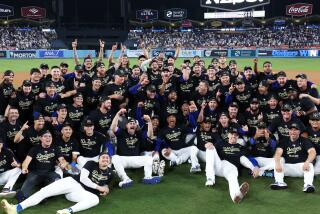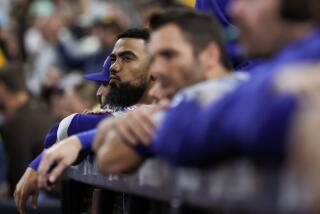Harris Knows How It Hurts to Be Hurt
- Share via
SAN DIEGO — Greg Harris has to look at guys like Tom Glavine, Greg Maddux and Mike Morgan and scratch his head in wonder.
At the same time, the Padres have to look at a guy like Greg Harris and scratch their heads in wonder.
It’s the kind of “what-if” stuff that drives folks bonkers. In the grand scheme, Harris is a very fortunate young man. He is handsome, intelligent and extremely well compensated for what he does. In a more specific sense, though, he has been plagued by a serial killer of misfortune.
Harris, as a starting right-handed pitcher for the Padres, has been going in starts and stops. He had tendinitis in his pitching elbow in 1991. He went on the disabled list twice this June, first with a bad back and then with a broken finger on his--you guessed it--pitching hand. Such problems take the ball out of your hand and the uniform off your back when you are a pitcher.
Therein lies a question the Padres--and their fans--are asking:
“Where would this baseball team be if Greg Harris had been healthy all year?”
“I can’t answer that,” Harris said diplomatically. “The guys who’ve replaced me have done a good job.”
One of the problems, to be sure, is ascertaining exactly what they are replacing. With Harris, it’s more a matter of projecting what he might do rather than what he has done.
You see, he has been a starting pitcher for only the last two years. The elbow injury limited him to 133 innings last year, and the sordid and assorted ailments this year kept him down to 66 2/3 innings before he came back Monday night. Add those numbers together, and that’s how much Harris would like to pitch in a single season.
His career earned-run average was 2.34 over 403 1/3 major league innings entering the 1992 season. Most of his appearances, 123 out of 152, had been in relief. Tag that low an ERA onto a pitcher who makes 35 starts, and you get a guy whose ratio of wins to losses is going to be pleasantly high.
“I’ve often thought about that,” Harris said. “About how a year might go without all these sudden stops. I go to spring training with a lot of things on my mind and a lot of goals set and then it goes out the window.”
He has only to look at the National League’s statistical leaders to deepen his wonder. Chicago’s Morgan, for example, has a 2.39 ERA with a 12-6 record. Atlanta’s Tom Glavine, for heaven’s sake, is 19-3 with a 2.48 ERA. Chicago’s Maddux has 15 victories with a 2.15 ERA.
Where would Greg Harris fit with this guys?
“You see guys with 17-7 records with the earned-run averages I’ve had through past experience,” he said, “and I’d like to see what kind of seasons I could put together if I stayed healthy. With a starting pitcher, innings are what it’s all about. My No. 1 goal coming into spring training was to get in my 200 innings and see what I can do.”
He managed only 20 starts last year, given his bout with tendinitis, and had a 9-5 record with a 2.23 ERA. Get him to 35 starts and that would project, approximately, to a 16-8 record. Pitchers with records like that find themselves being called “Ace” or “Doc.”
In 17 starts after coming off the disabled list last year, he gave up one earned run or fewer in 10 of them. A measure of his luck is that he won only six of those games, two of them by 1-0. That’s called maximizing minimum offense.
“I was pitching good at the end,” he said. “I was wishing the season would last another six months.”
However, 1992 would be a different year. Bad luck and injuries would be behind him.
Wrong.
He made three consecutive starts in April in which he allowed one earned run and never came away with a decision. On two occasions, he left the game with four-run leads in the ninth inning. Randy Myers is among the league leaders in saves, but poor Greg Harris was the pitcher of record when he squandered those leads.
And then came real bad luck . . . first, the back injury and, then, the broken finger.
“It’s been like a roller coaster,” Harris sighed. “Just when you feel like you’ve got something going, something happens. It hurts.”
And so it was that he came back Monday night against the Cubs. He pitched five innings, but one of them--the third--was a nightmare. He gave up six runs in that third inning and that was all Chicago got . . . or needed. The Padres lost, 6-3.
“The biggest thing I have to do,” he said, “is keep the team in the game. That’s what I didn’t do and that’s what really disappoints me.”
It had to be frustrating, because this wasn’t simply any other start. This wasn’t one out of 35. This was the first after seemingly so long on the sidelines. Its consequences were almost as magnified as if it had been opening day.
The point is that every pitcher has outings like that. One of Glavine’s three losses, for example, was a much more horrendous outing than that against the Padres. Those games happen.
Talent will come to the surface over the long haul. A game such as that can be lost and forgotten over the course of maybe 200 to 250 innings. Those are luxuries Greg Harris has never enjoyed.
The man must feel like he has spent his entire career driving in 5 o’clock traffic. Let the guy get up to speed just once, and stay there, and see what happens.
All this wondering will drive him--and the Padres--nuts.
More to Read
Are you a true-blue fan?
Get our Dodgers Dugout newsletter for insights, news and much more.
You may occasionally receive promotional content from the Los Angeles Times.








